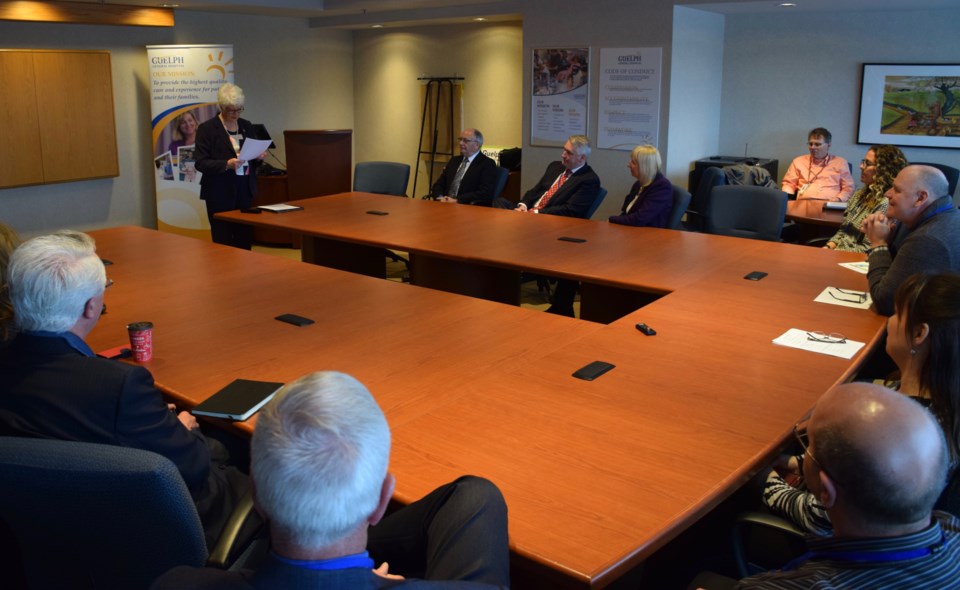Of the nearly half a billion dollars in new money for the hospital sector announced in last month’s provincial budget, just over $4.2 million of that will be spend on hospitals in Guelph and Wellington County.
Guelph MPP and Treasury Board President Liz Sandals made the funding announcement Friday at the Guelph General Hospital, in a boardroom populated by local hospital officials. She said the money will go to enhance access to a number of crucial health care services provided by hospitals.
Sandals highlighted the $919,300 going to Homewood Health Centre, saying that mental health is receiving more attention then it has historically, and the province has a focus on ensuring there is the capacity to address mental health issues.
“This year there is a much bigger focus on mental health, and that is at the provincial and federal level, and in hospital care and community care,” Sandals said. “We see in the local allocations that there is money available to increase care at the Homewood.”
Sandals said it is important to bolster community health care, but there are many circumstances where residents require hospitalization, whether due to emergency, complex and continuing care, acute care, or surgery.
“I’m really pleased that we’ve been able to address some of that in this year’s budget, to make sure that the great care that we have in our hospitals can continue,” she said. “As we were working through the budget process, we recognized that we need to continue to invest in our hospitals, and continue to make sure that our hospitals have adequate funding to deliver that care when somebody needs to go to the hospital.”
Dramatic growth in the Greater Toronto Area has put extreme pressures on the hospital system in that region, Sandals said, and the budget took steps to help alleviate that pressure.
The average increase in hospital spending is about three per cent, she said, but more like two per cent in areas not affected by rapid growth, areas like Guelph and Wellington County.
Money to address wait times has been directed to specific geographical areas, and specific areas of care for which there are wait time issues.
The budget aims to improve access and reduce wait times for chemotherapy, stroke treatment, hip and knee replacement, and magnetic resonance imaging, and provide better access to other services, including cardiac care, organ/tissue donations and transplants, and rare disease treatment.
To that end, Guelph General Hospital is receiving nearly $2.2 million, while St. Joseph’s Heath Centre is getting a $422,600 funding boost.
Groves Memorial Community Hospital will receive an additional $355,400, and $319,200 goes to the North Wellington Health Care Corporation.
Joan Fisk, chair of the Waterloo Wellington Local Health Integration Network (LHIN), said the funding means better access to local hospital-based health care.
“It means that we care about the residents that live in our communities, and that we care about their wellbeing,” she said. “It means we care about healthier communities. Yes, this means reduced wait times, but it also means working together on wait times.”
She commended the local health care sector for the work it has done to address mental health emergencies.
Residents that require emergency room care are very passionate about the amount of time they spend waiting in emergency, Fisk added.
“This LHIN is number 1 in the province for wait times – the best wait times on average than anywhere else in the province,” she said, adding that four hours for non-complex care and eight hours for complex care are numbers to be proud of.
There are 141 public hospitals in Ontario, each receiving a minimum of a two per cent increase to base funding in 2017-18. The province’s hospital budget will total $53.8 billion in 2017-18 fiscal year, up 3.8 per cent over last year.
Another $9 billion will be spent over 10 years in capital grants for hospital infrastructure improvements.
